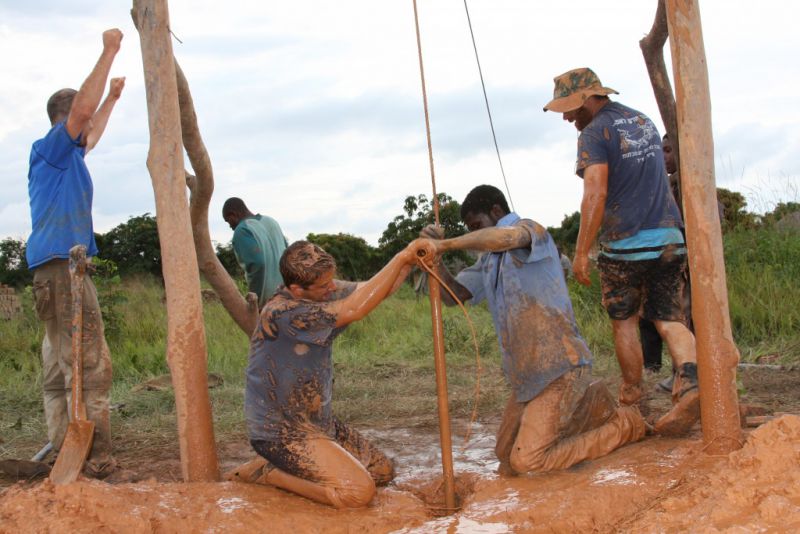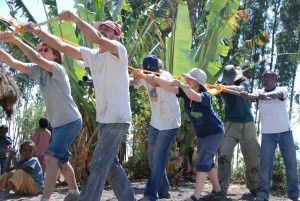Interview with Prof. Noam Weisbrod of Zuckerberg Institute for Water Research
Published on by Water Network Research, Official research team of The Water Network in Academic
The Water Network Team had the pleasure to talk to Prof. Noam Weisbrod , the director of Zuckerberg Institute for Water Research. Prior to being named director, Prof. Weisbrod was head of the ZIWR Department of Environmental Hydrology and Microbiology and the director of the Blaustein Center for Scientific Cooperation. He joined ZIWR in 2002.
Prof. Weisbrod is talking about ZUCKERBERG INSTITUTE, it's research, mission and plans for the upcoming years and the impact ZIWR will have on world water issues.
Q1. Thank you, Prof. Noam for talking to The Water Network, it is a pleasure to talk to you. It would be great to know more about your background and your work.
I earned my Ph.D. in 1999, a Master of Science in 1993 and a Bachelor of Science in 1990 from the Hebrew University of Jerusalem, Department of Soil and Water Sciences and later. After my Ph.D., I spent two and a half year at the department of bioengineering at Oregon State University as a post-doc and a research assistant professor. In 2002, I moved back to Israel for a lecturer position at the ZUCKERBERG INSTITUTE for water research, BGU. I was named as director of the Zuckerberg Institute last year and prior to that, I was the head of the Department of Environmental Hydrology and Microbiology and the Director of the Blaustein Center for Scientific Cooperation.
My research is very diverse, but in general, I mostly work on contaminant transport in the subsurface. Specifically, I have conducted and published numerous of studies on colloidal transport, fracture flow, gas flow at the Earth-atmosphere interface and on evaporation – salinization processes.
Q2. ZUCKERBERG INSTITUTE is a young institute; what is your personal experience of working here? What is your vision for the ZUCKERBERG INSTITUTE for water research?

Students help a village in Zambia access clean water. Many Rural Water Developments projects are deliberately low-tech so local villages can easily replicate and maintain them.
It is indeed a young institute in age but also as a young, dynamic with lots of great young researchers with strong motivation, open minds, and the drive to be better all the time. We are already a leading water institute. My vision for the Zuckerberg Institute is to be one of the first names to be mentioned, worldwide, in relation to water problems in general and in an arid and semi-arid environment in particular.
Q3. It would be good to understand about ZUCKERBERG INSTITUTE’s experimental and theoretical approaches to conducting fundamental research related to water.
We have a very multidisciplinary team of researchers. We have several researchers that are focusing on experimental work in our laboratories. It is worth mentioning that within our laboratories one can find studies from pore-scale (micro-scale, nano-scale) studies to darcy-scale and pilot scale experiments. We also have quite a few field studies in which our team is exploring phenomena in the field and we do have all the equipment needed to run field studies. In addition, we have a few theoreticians that focus on modeling and simulations. Our multidisciplinary nature enables us to deal with basic science and fundamental research in parallel to the exploration of very practical solution to water-related problems.
Q4. Can you tell us more about the knowledge transfer from the laboratory to a pilot project?
Once the concept is demonstrated on a lab scale, we identify a potential partner from the industry, a donor, or funding agency and try to generate the required funding via a research proposal. We often consult with B.G. Negev Technologies in this activity. In parallel, we find an interested user who is willing to accommodate and assist maintaining the pilot.
For example: constructed wetland and Biogas units in remote goat farms. GW systems in 20 households throughout the country etc.
Q5. What are the Mile Stone projects ZUCKERBERG INSTITUTE conducting these days? Is there any in the developing countries?
- Education – we are trying to get our graduate students connected to NGOs and projects in rural Africa
- We submitted a proposal (not funded yet) to construct a water purification system specially designed for rural areas in Africa.
- Development of an aquaponics system in a rural setup such as in Africa (production of high-quality fish and vegetable) in an off-grid setup that is fed by the system’s waste (which is used as biogas). This setup will allow sustainable and economic production of high-quality food, in a fully (almost) recirculating system (very little water use) and without external energy (all will be supplied by bio gassing the system waste and also as means to treat the waste produced by the system).
- Hydrothermal carbonization of agrowaste and human excretions. Also in an off grid setup, suggesting improvement of sanitation in developing countries. The wet waste will be treated in a manner that will produce renewable energy source (hydrochar) as well as liquid fertilizer while eliminating the potential pollution by these wastes.
- Low cost/low tech systems for safe on-site Greywater/wastewater reuse, mainly for irrigation and toilet flushing.
Q6. Does ZUCKERBERG INSTITUTE have the vision to help developing countries or say Countries in need of water with their research?
 Helping developing countries with a solution to water shortage is one of the missions of the ZUCKERBERG INSTITUTE for water research. Unfortunately, due to lack of funding we are not doing it enough. Nevertheless, we are in contact and collaborating with the Bedouins in Israel – wastewater, sludge and agrowaste treatments (specifically via the Wadi Attir project). Collaborate with the Palestinians and Moroccans on the Hydroponic projects and trying to advance the carbonization project via research proposal, aimed at the developing countries.
Helping developing countries with a solution to water shortage is one of the missions of the ZUCKERBERG INSTITUTE for water research. Unfortunately, due to lack of funding we are not doing it enough. Nevertheless, we are in contact and collaborating with the Bedouins in Israel – wastewater, sludge and agrowaste treatments (specifically via the Wadi Attir project). Collaborate with the Palestinians and Moroccans on the Hydroponic projects and trying to advance the carbonization project via research proposal, aimed at the developing countries.
It should be noted, that all of these projects are multidisciplinary in nature and although led by us we have various collaborators (that without them all these projects could not have been materialized).
Q7. Is there any new groundbreaking research carried out in the institute which addresses the Remediation of contaminated water?
There are several very interesting studies at the ZUCKERBERG INSTITUTE about remediation and bioremediation of perchlorate and other contaminants, including some projects about bioremediation of various organic contaminants at the Neot-Hovav site. We are involved in several projects running in industrial sites (and in the lab as well). I don’t know if one of these studies will lead to groundbreaking solutions, but I can definitely say that there are quite a few promising and innovating results.
Q8. The ZUCKERBERG INSTITUTE is being actively involved in new membranes and processes for reverse osmosis research, do you wish to share any findings or results with our readers?
RO desalination research is focused on the following subjects:
- Novel pretreatment technologies of the feed tertiary wastewater for their desalination and eventually, their non-restricted irrigation.
- Development of RO membranes that can cope the exposure to oxidizing agents for improved cleaning and fouling control
- Fundamental understanding of microbial biofilm growth on RO membranes in order to avoid biofilm development on the membrane surface.
- Modification of commercialized RO membrane in order to reduce their fouling and biofouling propensity.
Q9. As we know the amount of water used in Irrigation is huge and people are talking about re-utilizing Grey Water for irrigation purpose. Has ZUCKERBERG INSTITUTE conducted any experimental research on this topic?
We have an extensive research effort in this direction.
- We have established the largest field study in the world with over 20 similar systems spread all over the country and monitored for over 7 years now.
- We are involved in large array of research topics such as: development of treatment units, environmental aspects associated with greywater reuse (impact on soil, plants, GHG etc.), health and environmental risk assessments (development of antibiotic resistance, epidemiological evaluation, quantitative microbial risk assessment etc.)
- We have published large numbers of articles as well as the first comprehensive research-oriented book called greywater reuse (2015).
- And we are active in advancing safe greywater reuse in Israel
Q10. Thanks a lot Prof. for sharing details about ZUCKERBERG INSTITUTE, your vision for the institute and the excellent research work the institute is carrying out. Would you like to address our young water leaders for motivating them to get involve more and more with water research?
I believe that the fact that water scarcity will become a bigger and bigger problem in the next two decades is clear. The superposition of population growth, improving lifestyle, unstable climatic conditions and desertification mean the more water will be needed – much more. The food-water-sanitation nexus is one of the press concerns and not only in the developing countries, where in some cases we are already facing a real catastrophe. Therefore, the need for bright ideas and creative solutions in the water sector is obvious. The world needs to find ways to create more crop per drop, new water sources and significantly improve water management in all scales – both quality and quantity. I think that there are lots of scientific challenges and business opportunities in w and young people will make a very smart decision if they will become active and invest their skills and motivation in water.
Read More Interviews from the 'In Conversation With' Series
by The Water Network
Media
Taxonomy
- Research Institute
- Education Institute
- Wastewater Phycoremediation
- Institutional Development & Water Governance
- Commercialization of Research
- Environmental Research
1 Comment
-
Prof Noam, Thanks for what you do in Africa. Can we work with you in Africa? see www.interwaste-ea.co.ke again thank you and The Water Network.Rgds John Gakunga